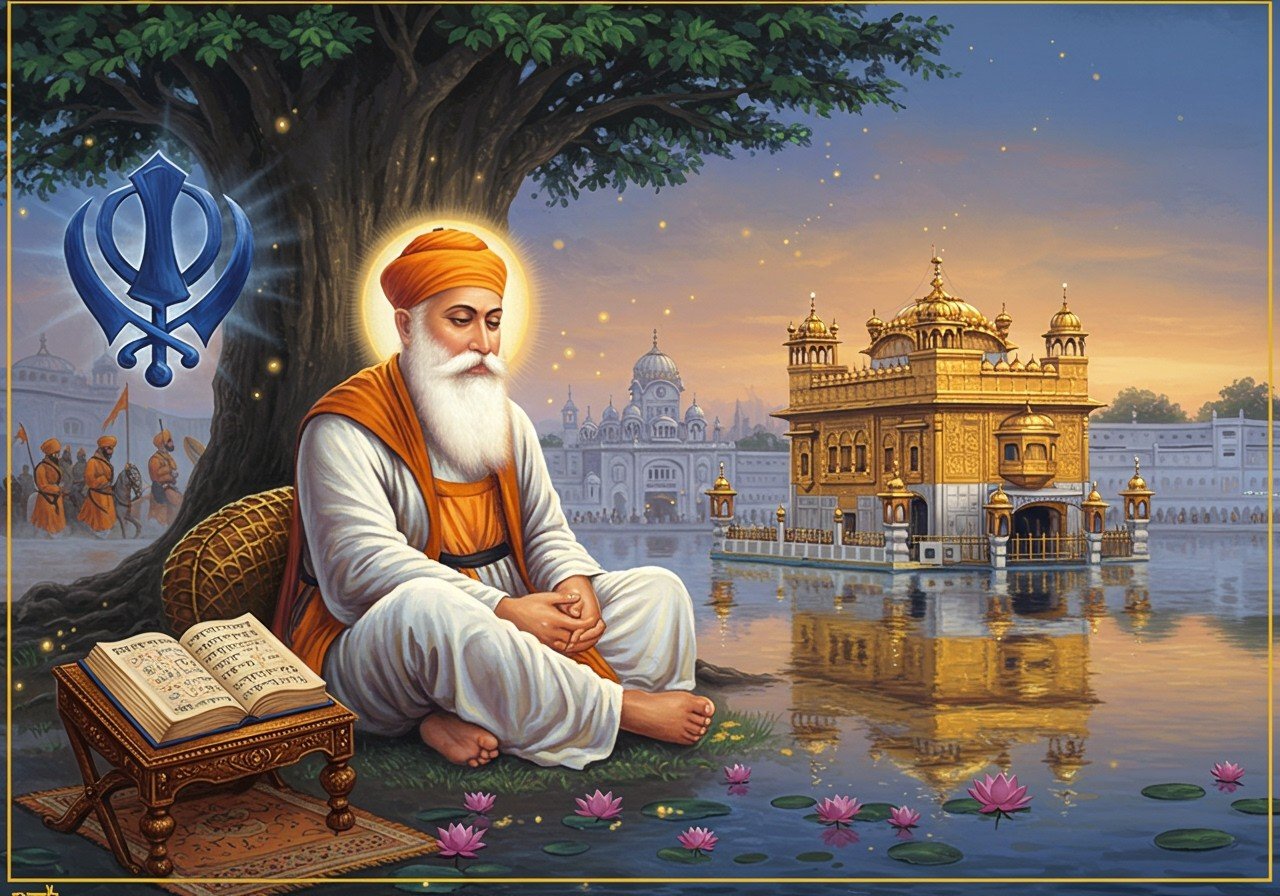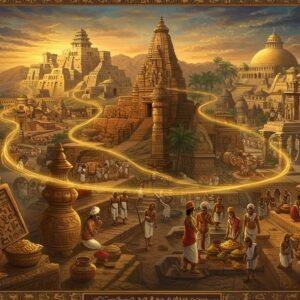
Sikhism, a relatively recent major world religion, originated in the Indian subcontinent. This article delves into the captivating history of Sikhism in India, exploring its origins, fundamental beliefs, and cultural influence, particularly in Punjab. This guide is tailored for culturally aware, middle to upper-middle-class Indians between the ages of 25 and 60 who appreciate tradition and seek authentic ritual items with the ease of online shopping.
Origins of Sikhism
Guru Nanak founded Sikhism in the late 15th century in Punjab, a region then influenced by Hinduism and Islam. Guru Nanak’s teachings emphasized the unity of God and rejected the caste system, practices like fasting, idolatry, and gender discrimination. He established Kartarpur, the first Sikh commune. The Guru Granth Sahib, Sikhism’s sacred scripture, is a compilation of teachings from the Sikh Gurus and other saints.
The Ten Sikh Gurus
Ten Sikh Gurus shaped the faith. Guru Nanak laid the foundation. Guru Angad introduced the Gurmukhi script. Guru Arjan compiled the Adi Granth. Guru Hargobind militarized the community. Guru Gobind Singh established the Khalsa in 1699. Upon his death, spiritual authority passed to the Guru Granth Sahib.
The Formation of the Khalsa
Guru Gobind Singh founded the Khalsa during Vaisakhi in 1699. The first five Sikhs, the Panj Pyare, were initiated. Khalsa principles include the Five Ks: Kesh (uncut hair), Kangha (comb), Kara (steel bracelet), Kachera (special undergarment), and Kirpan (ceremonial dagger). The Khalsa strengthened Sikh identity and provided resistance against Mughal oppression.
Sikhism in Punjab
Sikhism has profound ties to Punjab. Amritsar, home to the Golden Temple, holds immense historical significance. Sikhs have made substantial contributions to Punjab’s agriculture, including the Green Revolution. The 1947 Partition of India significantly impacted Punjab’s Sikh community.
Sikhism in Modern India
Sikhs play a vital role in contemporary India, contributing to politics, sports, and the military. Many Sikhs have achieved remarkable success. The community actively preserves its cultural heritage and fosters interfaith harmony. Despite progress, they still face challenges related to identity and discrimination. Currently, Sikhs constitute 57.7% of Punjab’s population. Projections estimate over 30 million Sikhs in India by 2050.
Sikh Festivals and Traditions
Important Sikh festivals include Guru Nanak Jayanti, Vaisakhi, and Gurpurabs. Gurdwaras serve as places of worship and community service. Langar, a communal meal offered to all gurdwara visitors, embodies selfless service. Sikhs observe significant life events with ceremonies like Anand Karaj, the Sikh marriage ceremony. Seva, or selfless service, is a core Sikh principle, reflecting the community’s dedication to equality and compassion.
Sikhism FAQs
What is the core belief of Sikhism? Sikhism centers around the belief in one God and emphasizes equality, selfless service (seva), and honest living.
What is the role of the gurdwara? Gurdwaras serve as places of worship, community gatherings, and selfless service. They offer langar (free meals) to everyone, regardless of background.
Poojn.in: Supporting Your Spiritual Journey
Poojn.in offers a wide selection of products to support your spiritual practice, no matter your faith. Explore our diverse collection of items for prayer, meditation, and traditional ceremonies:
-
Sacred Texts and Literature: Find religious texts, educational materials, and resources to deepen your understanding of Indian spiritual traditions. Explore our blog post on Hinduism’s impact on Indian art and culture for a broader perspective.
-
Prayer and Meditation Items: Enhance your practice with high-quality prayer mats, meditation cushions, and traditional incense. Consider our Kushal Mangal Sandalwood Puja Prayer Agarbatti Incense Sticks for a truly immersive experience.
-
Traditional Offerings: Find pure ghee and oil lamps, fresh flowers, garlands, and natural incense sticks for your offerings and rituals. Learn more about devotional practices in our dedicated blog section.
Visit Poojn.in today to discover our complete collection and experience the convenience of online shopping for authentic ritual items.
Conclusion
Sikhism is a dynamic and enduring faith that has profoundly impacted India’s cultural and spiritual landscape. From its inception with Guru Nanak to the Khalsa’s establishment by Guru Gobind Singh, Sikhism has consistently championed equality, selfless service, and the oneness of God. The strong connection between Sikhism and Punjab, the Golden Temple’s significance, and the Sikh community’s contributions across diverse fields underscore their resilience and commitment. Today, Sikhism thrives, celebrating its rich traditions and values that enrich Indian society. Despite facing challenges, Sikhs proudly maintain their heritage and strive for a harmonious future. Embracing Sikhism’s teachings promotes unity and compassion in our diverse world.


